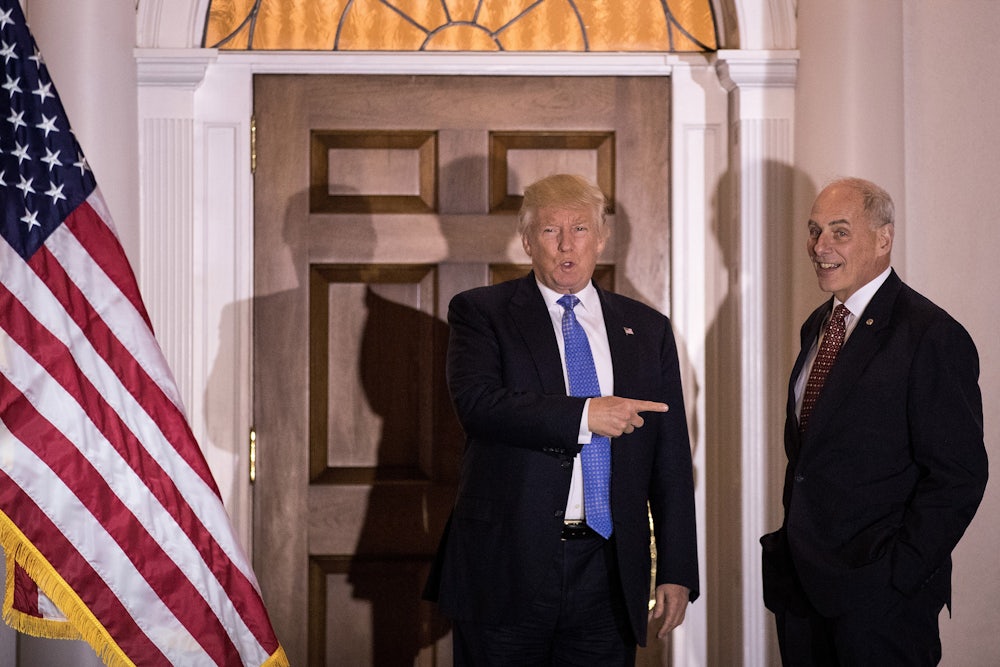Within hours of John Kelly’s swearing in as Donald Trump’s second White House chief of staff, the retired general and former Homeland Security secretary had guaranteed himself good opening night reviews by firing the president’s self-obsessed communications director, Anthony Scaramucci, who had been on the job for just ten days. “Today was a major day for the Trump presidency,” Brent Budowsky, a former Democratic aide, opined in The Hill after Scaramucci was sacked. “Kelly was a good choice for chief at a difficult time for the Trump presidency.”
In any other professional environment, firing someone like Scaramucci, who is essentially hair gel in human form, would be treated less as a triumph than a bare-minimal requirement of effective management. For those who will read this article upon return from a two-week vacation beyond the reach of newspapers and modern technology, Scaramucci ended his fifth day on the job by phoning up New Yorker reporter Ryan Lizza to threaten the lives and legal freedom of his White House colleagues and accuse one of them of engaging in auto-fellatio. On Monday, Lizza wrote, “The sacking of Scaramucci signals that Kelly, a retired marine general, may actually be empowered to be a true chief of staff. There was no bigger test for Kelly than the fate of Scaramucci...”
Kelly deserves about as much praise for firing Scaramuci as Reince Priebus, Trump’s first chief of staff, would have deserved if he had fired former press secretary Sean Spicer for urinating on the press corps from the briefing room podium. Moreover the odds that Kelly will be an effective chief of staff are frankly very low. Kelly has no depth of experience in domestic politics, beyond his brief stint as the nation’s top deporter of law-abiding immigrants. Trump is essentially unmanageable as a president, and while Kelly might do a better job enforcing hierarchy within the West Wing than Priebus did, he will lack basically all of the other relevant kinds of experience that presidents should expect from their chiefs.
If we must grade Trump officials on a curve, though, the appropriate test isn’t whether Kelly has the mettle to fire a middling buffoon, but whether he can restrain the one who inhabits the Oval Office from gutting the rule of law. The only questions that matter now are whether Kelly can prevent Trump from moving against Robert Mueller, the Justice Department special counsel in charge of the Russia investigation,
and whether he will resign if he can’t.
On Monday, just as most politicos were delighting in the news of Scaramucci’s firing, CNN broke a far more interesting story about how Kelly reacted back in May to the stunning news that Trump had fired FBI Director James Comey.
“New White House chief of staff John Kelly was so upset with how President Donald Trump handled the firing of FBI Director James Comey that Kelly called Comey afterward and said he was considering resigning, according to two sources familiar with a conversation between Kelly and Comey,” CNN reported. “Comey, who took Kelly’s call while traveling back from Los Angeles to Washington, responded to Kelly by telling him not to resign, one of the sources said. The sources said Comey and Kelly are not close friends but that they had a professional relationship and a deep mutual respect for each other.”
It’s unclear whether the origins of this story lie in the Comey camp or the Kelly camp, but the effect in either case is to limit Kelly’s leeway in the event that Trump sets a process in motion aimed at ousting Mueller or quashing his investigation.
If Kelly or his allies orchestrated this leak, it would suggest a serious determination on his part to use his chief-of-staff power to protect the Russia investigation. If Comey or his allies were the prime movers, the motivation was apparently to force Kelly to live up to the standard he at least pretended to hold when he called Comey to vent two and a half months ago.
Kelly can use his influence over administrative staffing decisions in different ways. He can discourage Trump from firing or abusing Attorney General Jeff Sessions, who has recused himself from the Russia investigation. Given Trump’s public attestations that having an unrecused A.G. is a significant priority for him, Kelly can insist that any Sessions replacement promise to recuse himself, too. He can promise to resign if Trump attempts to obstruct the investigation. And, of course, he can actually resign if he believes Trump is meddling in the investigation in a corrupt fashion.
These wouldn’t be particularly brave steps, so much as matters of basic ethics. Treating the refusal to be complicit in an effort to obstruct justice as a metric of success is the kind of pathetic standard that would signal a failed professional culture in any other workplace. But Trump needs a chief of staff, even if our expectations for any chief of staff in this White House are by necessity very low. It just happens to be the case that the least the new chief of staff can do to prove his worth will also be critically important to the wellbeing of American democracy.
